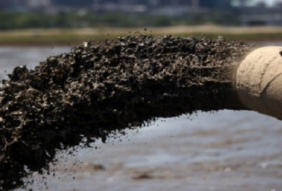
Posted on May 16, 2016
By James F. McCarty, Cleveland Connects
The U.S. Senate on Thursday passed an energy and water appropriations bill that included a provision inserted by Sen. Sherrod Brown that prevents the U.S. Army Corps of Engineers from dumping polluted dredged sediment directly into Lake Erie.
Over the past year, the Army Corps has been engaged in a federal lawsuit against the Ohio EPA and the Port of Cleveland seeking permission for open-lake dumping. The agency contends the sediment is clean enough to dispose directly into the lake.
U.S. District Court Judge Donald Nugent blocked the Army Corps’ request last year, and ordered the agency to dump the dredged sediment into a confined containment dike as it has for the past 40 years.
“It’s essential to the Port of Cleveland and Northeast Ohio businesses that the navigation channel of the Cuyahoga River is maintained,” Brown said in a news release. “While dredging is critical for the region’s economy, it shouldn’t compromise efforts to improve water quality and restore the health of the lake.”
Brown’s language in the bill ensures that open-lake dumping can occur only if strict environmental standards set by the Ohio EPA are met.
Earlier this year, the Ohio EPA declined to grant the Army Corps a permit for open-lake dumping, citing tests that found the sediment in the shipping channel too polluted with PCBs to dispose of in the lake.
Meanwhile, Ohio’s other U.S. senator, Rob Portman, is a heading a Senate subcommittee that is investigating allegations that the Army Corps deliberately cut more than $3 million budgeted for dredging Cleveland harbor from its 2016 federal appropriation. Afterward, the Corps claimed it didn’t have enough money to dispose of the sediment in containment dikes.
Port of Cleveland President and CEO Will Friedman told Portman that the Cleveland Harbor dredging project was the only example where the Army Corps asked Congress for a cut in funding in the lower 48 states last year.
Source: cleveland.com





